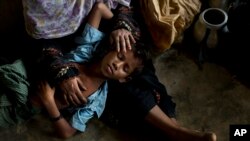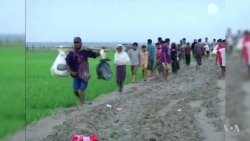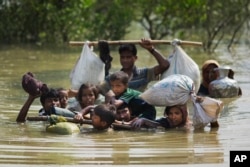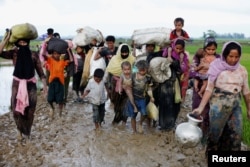The United States is expressing deep concern about the situation in Myanmar's northwestern Rakhine state, where tens of thousands of Rohingya Muslims have been forced to flee across the border to Bangladesh, and it says it is in close contact with the Naypyidaw government.
State Department spokeswoman Heather Nauert on Thursday spoke to reporters about Myanmar, also known as Burma.
WATCH: US 'Deeply Concerned' About Rohingya Crisis, in 'Robust Dialogue' With Myanmar Government
"We are deeply concerned by the troubling situation in Burma's northern Rakhine state," she said. "There has been a significant displacement of local populations following serious allegations of human rights abuses, including mass burnings of Rohingya villages and violence conducted by security forces and also armed civilians.
"We again condemn deadly attacks on Burmese security forces, but join the international community in calling on those forces to prevent further violence and protect local populations in ways that are consistent with the rule of law and with full respect for human rights," she said. "We urge all in Burma, including in the Rakhine state, to avoid actions that exacerbate tensions there."
Nauert also said the U.S. welcomed acknowledgement by the Myanmar government of the need to protect all communities, and its pledge to implement recommendations of the advisory commission on the Rakhine state aimed at addressing long-standing challenges that predate the country's democratic transition.
Asked whether the U.S. had confidence at this point in the desire of Myanmar's government to protect the Rohingya community, Nauert said the U.S. would certainly like to call on Myanmar to allow better access to the country for reporters and humanitarian aid groups.
Fleeing violence
The latest round of violence began August 25 when a group of Rohingya insurgents attacked police posts and an army base in what they said was an effort to protect their ethnic minority from persecution. Rakhine state is home to most of the Rohingya minority group.
Subsequent clashes and a military counteroffensive have killed at least 400 people and triggered the latest exodus of Rohingya villagers to Bangladesh.
Vivian Tan, the Asia spokeswoman for the U.N. refugee agency in Bangladesh, told VOA Burmese that aid workers estimated there were 164,000 new arrivals in Bangladesh.
The United Nations said about 146,000 people had crossed the border into Bangladesh’s Cox’s Bazaar district since August 25.
Officials said the U.N. World Food Program had provided high-nutrient porridge and other food to tens of thousands of women and children who arrived in Bangladesh hungry and malnourished. The agency said it needed $11.3 million to support the influx of people, in addition to those already living in camps.
The United States had strongly condemned the August 25 deadly attacks on security posts by a group called the Arakan Rohingya Salvation Army (ARSA) and urged all ethnic groups in Myanmar to “work toward peace and stability.”
Myanmar’s de facto leader, Aung San Suu Kyi, has been criticized for her response to the violence. Many observers say she has played down reports of the Burmese military's brutal treatment of Rohingya civilians. Suu Kyi maintains there has been “a huge iceberg of misinformation” about the Rohingya crisis and violence in Rakhine following the attacks on security posts.
Twitter photos that allegedly showed dead Rohingya people were later proved to be unrelated to the current violence, according to a statement posted on Facebook by Suu Kyi’s office.
The Nobel Peace laureate said “fake information” had been used to promote the interests of “terrorists,” a word she used to describe ARSA insurgents.
State Department spokeswoman Nauert declined to comment when asked whether Suu Kyi should return her Nobel Peace Prize.
Priscilla Clapp, who served as chief of mission and permanent charge d'affaires at the U.S. Embassy in Myanmar from 1999 to 2002, said a lot of the criticism of Suu Kyi was unfair, because of the limitations on her power and influence.
"In a way, she's at a great disadvantage with the military, which controls all the security of the country and much of the government administration from before," said Clapp, currently a senior adviser to the U.S. Institute of Peace and Asia Society.
Clapp also blamed the ARSA group, calling them terrorists who had deliberately provoked extreme reaction on the part of the security forces. But she also maintained that security forces must be "much more moderate in the way they approach these things and sensitive to community relations."
International pressure
Human rights advocates urged the Burmese government to stop the violence.
“The governments of the world have to press very hard on Aung San Suu Kyi and also the Burma military to stop the violence,” Human Rights Watch Deputy Asia Director Phil Robertson told VOA, adding independent monitors should be granted access to assess allegations of serious human rights violations committed by ethnic Rohingya refugees who fled into Bangladesh.
Robertson urged the United States and other nations to provide more humanitarian relief and medical assistance to the refugees.
“So far we have seen very little comment from the Trump administration about the situation, which is quite shocking,” said Robertson. “There is a massive humanitarian crisis in a country which, until recently, the United States spent a great deal of time trying to understand them and work with the government on various developments and trade.”
Former U.S. diplomat Clapp said the complexity of the situation merited a more nuanced reaction from world leaders.
"To reduce it to simplicity and black-and-white equations is not helpful. It's just inflaming further problems inside the country and it's making the population more resistant to international advice," Clapp said. "We have to be much more understanding and get involved on the ground in helping them resolve this problem."
Abuses against and restrictions on members of the Rohingya population were cited as one of the leading human rights problems in Myanmar, according to State Department's 2016 Human Rights Report.
The Rohingya are one of Myanmar's many ethnic minorities in the Buddhist-majority nation. The Myanmar government considers the Rohingya to be economic migrants from Bangladesh and has never granted them citizenship, even though most can show their families have been in the country for generations.
VOA’s Burmese service contributed to this report.
















